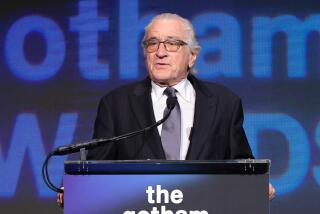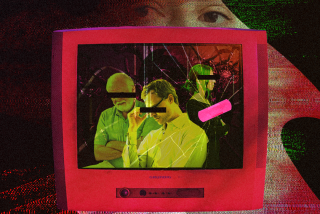‘Django Unchained’s’ word-use controversy rages on
- Share via
If there’s been one controversy that’s dogged Quentin Tarantino for most of his career, it’s been his frequent and pronounced use of the N-word in his scripts, dating all the way back to his debut film, “Reservoir Dogs.” Perhaps the only time that particular racial epithet hasn’t been central to the discussion of one of his films was “Inglourious Basterds,” when the N-word of choice was Nazis.
But with “Django Unchained,” the controversy is back, and Tarantino is getting an earful from all sides, including fellow filmmaker Spike Lee and comedian Katt Williams, who have been very vocal in their criticisms of Tarantino’s word choice.
Lee, who took explicit issue with use of the word in Tarantino’s 1997 film “Jackie Brown,” doesn’t seem to have changed his feelings about the writer-director’s approach to race now. He is altogether avoiding Tarantino’s attempt to turn America’s slave past into a spaghetti western. He told Vibe magazine, “I can’t speak on it ’cause I’m not gonna see it. The only thing I can say is it’s disrespectful to my ancestors, to see that film.”
Williams took a more direct approach, telling a TMZ photographer, “When I see Quentin Tarantino, I’m going to take this fist and put it right in his mouth where he says ... at.”
As noted by a story in The Times, this Tarantino film is stirring up rawer emotions, not just because of the pronounced use of the N-word, but specifically because of the era it is depicting. As Erin Aubry Kaplan writes, “This movie is different because it mines slavery, the complicated source material for so much black culture and fountain of violence in American history.”
Tarantino hasn’t been totally on his own in this controversy, however. “Training Day” director Antoine Fuqua has defended the filmmaker, as have several other notable members of the Hollywood community, including Samuel L. Jackson.
Jackson, who appears in “Django Unchained,” made a Houston TV interviewer squirm in his seat when the interviewer attempted to broach the subject of the film’s use of the N-word. Rather than go along with the line of questioning, Jackson insisted that the interviewer say the word in question to him, something the white interviewer declined to do, eventually changing the subject. (The video is below, with the key exchange beginning about 14 minutes in.)
In an interview with the Root’s editor and Harvard professor Henry Louis Gates Jr., Tarantino defended his use of the word, calling the criticism “ridiculous” and explaining, “Well, you know, if you’re going to make a movie about slavery and are taking a 21st-century viewer and putting them in that time period, you’re going to hear some things that are going to be ugly, and you’re going to see some things that are going to be ugly.”
The filmmaker isn’t one to run from controversy, and in an interview with the L.A. Times, Tarantino went even further in his own defense, bragging, “Even for the movie’s biggest black detractors, I think their children will grow up and love this movie. I think it could become a rite of passage for young, black males.”
As bold as that proclamation may be, Tarantino may not be totally off the mark. Despite objections from Lee and others, including Tim Cogshell, film critic for KPCC’s “Filmweek,” “Django” received four NAACP Image Award nominations, including one for best picture. And if the film picks up Oscar nominations next week, expect the controversy to get even louder.
ALSO:
‘Django,’ unchained, looks at U.S.’ past
‘Django Unchained’ was more than a role for Kerry Washington
Samuel L. Jackson on slavery, entertainment, guns in ‘Django’
PHOTOS AND MORE
VIDEO: The making of ‘Argo,’ ‘Les Miz’ and more
VIDEO: Holiday movies - A video guide
PHOTOS: NC-17 movies: Ratings explained
More to Read
The biggest entertainment stories
Get our big stories about Hollywood, film, television, music, arts, culture and more right in your inbox as soon as they publish.
You may occasionally receive promotional content from the Los Angeles Times.











